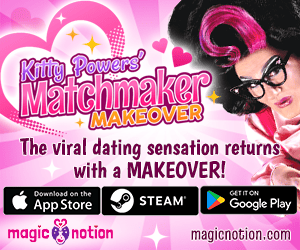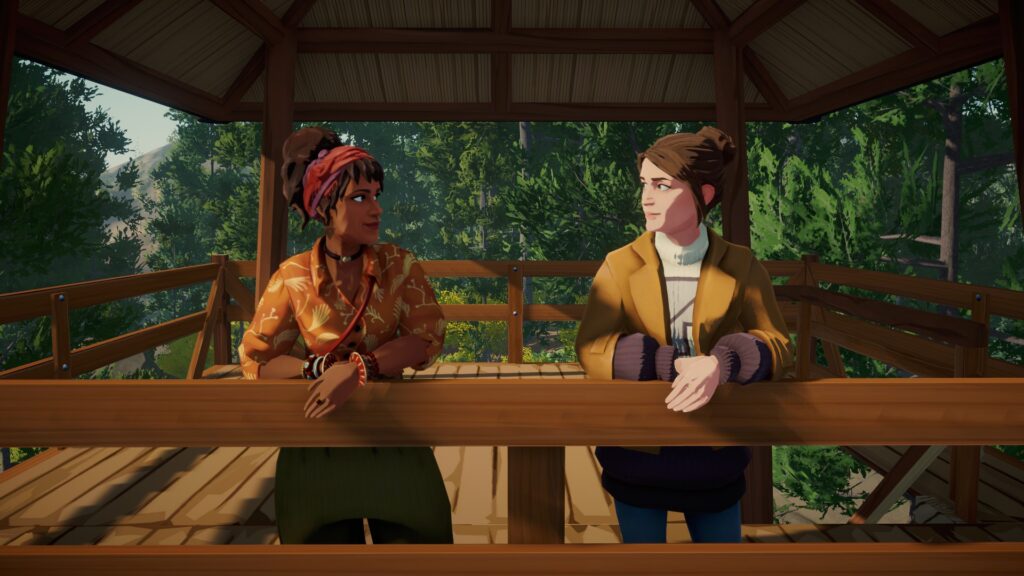
Lake perfectly captures the idyllic town – and the hellscape it can be for queer people
On paper, Lake is a simple game. You play as Meredith Weiss, a middle-aged woman who moves back to her hometown of Providence Oaks to deliver mail to the residents there. And in practice, the game nails that simplicity. It’s just that… Lake is also a game that is undeniably queer – right down to its very core.
In Lake, it’s 1986 and Meredith Weiss is feeling something akin to a mid-life crisis. She’s got a very successful job in the city and is well-liked by her friends and colleagues there. More importantly, she’s the cog that makes her company run smoothly, she’s depended on to the point that when we first meet Meredith she’s working overtime while her colleagues’ party the night away. It’s stressful to watch, but there’s a part of me that relates to her need to be useful, to keep everything as smooth as butter.
Now don’t get it twisted, there’s nothing in Lake that implies Meredith hates her job. It’s clear she likes programming, and even though her boss is a total idiot who won’t leave her alone when she’s on holiday, she values her time in the big city. There, she feels she has a purpose.
And then Meredith goes to Providence Oaks, where she gets a renewed taste of the rural, idyllic town that she grew up in. She was last here when she was a young adult moving to go to college, and now she’s stepped into the same shoes of her father as a mail service worker. Not only does she reunite with old friends, but she meets new ones too – including some that are fascinated by her in a way that goes beyond friendship.
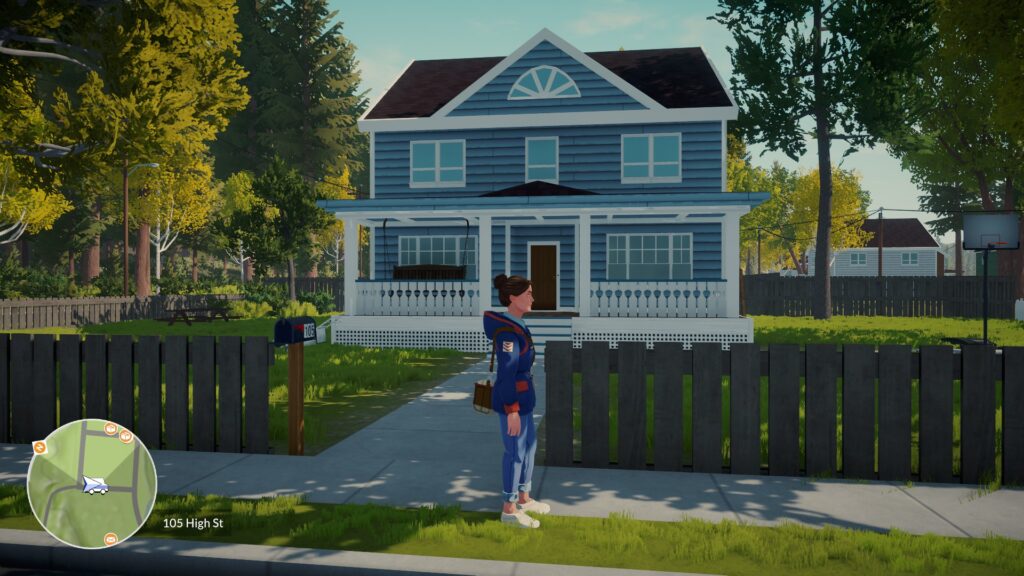
You may be wondering where being queer and queerness fits into Lake then. After all, it’s a game that is simple in the best of ways: all you’re doing is talking, driving, possibly romancing someone, and if you really want to shake things up, playing an arcade game over at Mo’s Diner. With so little to do, what does Lake have to say about queerness?
Well, it’s what Lake doesn’t say that makes it a queer game. Lake is set in 1986, a surprisingly progressive year for LGBT+ rights in some parts of America and Canada, notably in big cities like New York and Sacramento, California. While Providence Oaks is fictional, its backdrop is Oregon – a state that decriminalized same-sex relationships and activity back in 1972. More than 10 years later, and you’re driving a mail truck around while making heart eyes at the lady who runs a store with the most sapphic appropriate name ever: The Flick Shack.
That’s right, Meredith can be played as someone who is interested in women. However, her desire for women is never vocalized without the opportunity being handed to her on a silver plate, such as when Angie expresses her affection for Meredith by calling her ‘babe’ or not exactly denying her desire to go on a date with the player when questioned about it. It’s moments like this where Meredith is able to take charge, show her vulnerability, and express queer desire in the comfort of someone she trusts and can relate to. Even when Meredith talks to her parents after the workday, they aren’t ever able to express their queer self, only that they have an interest in someone in Providence Oaks. Even with all of the laws saying that same-sex relationships aren’t prohibited or criminalized, it feels fitting for Meredith to still be wary about her queerness with anyone but Angie, her potential love interest.
Romance in Lake isn’t all-encompassing. It isn’t going to take up all of Meredith’s time and, in fact, you’ll be spending most of your two weeks actually just reconnecting with not just your friends and family, but nature in general as you truck around Providence Oaks. That doesn’t mean romance isn’t at all important though, and Angie’s romance in comparison to your other love interest, Robert, is what further proves my point about Lake being not just a story of self-discovery and recollection for Meredith but potentially one where queer anxiety is brought to the surface too.
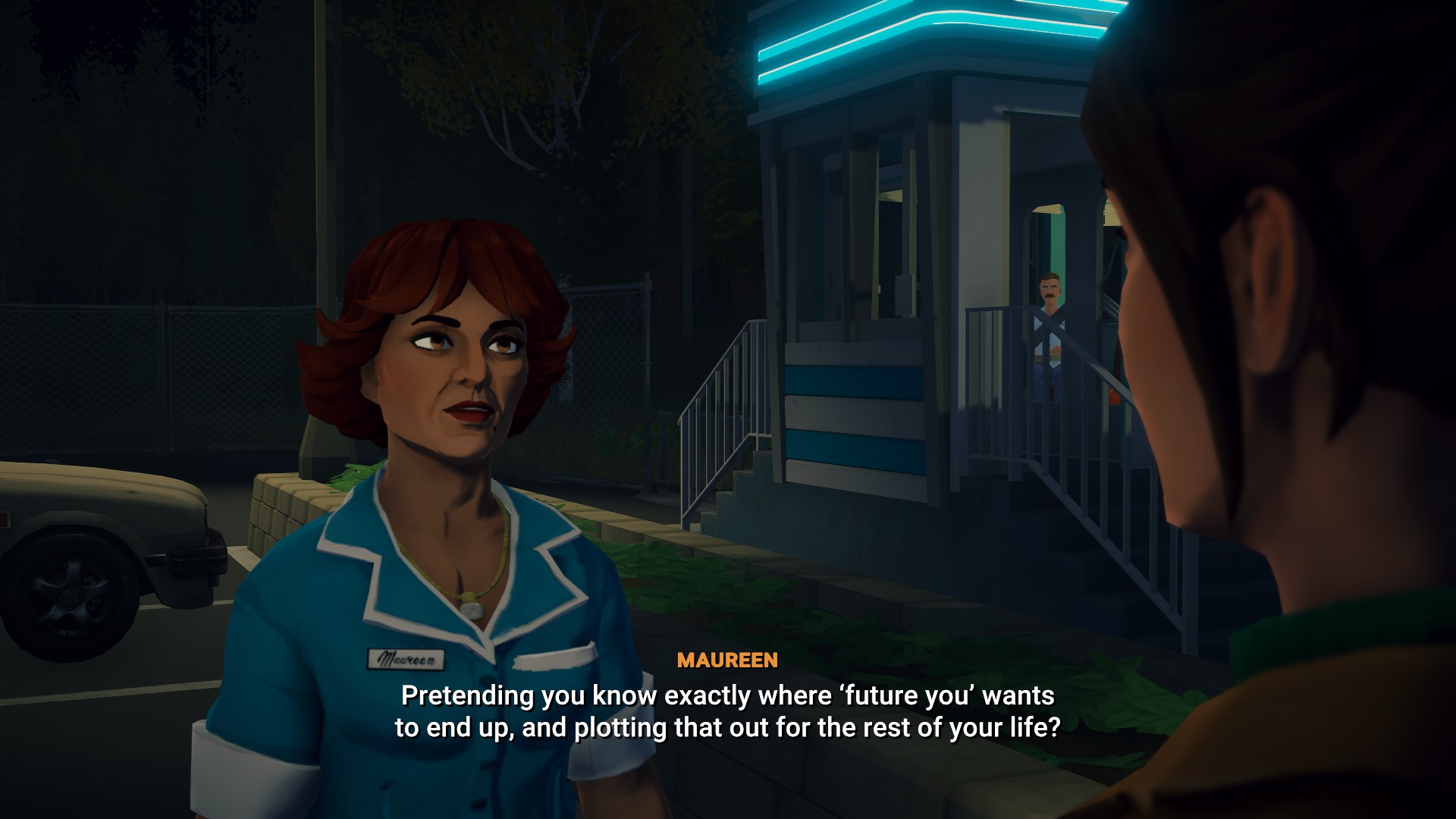
Queer anxiety can be summarised as feeling like an ‘outsider’, or that if the real you was revealed to everyone then they wouldn’t accept you. This isn’t necessarily conveyed through the game itself – which often walks the line of relaxation and boredom at times – but as a queer woman playing Meredith as one, I couldn’t help but notice how out of place the queer characters felt within the town. Both Meredith and Angie are outsiders for different reasons: the first is because unlike a lot of the characters you meet, Meredith actively left Providence Oaks to make it big in the city, whereas the latter tries to bring something new and progressive, like film, to a town whose idea of fun is going fishing because most are in their 40’s and over. Angie and Meredith – and Lori, the only teenager in town – represent change. Of course, none of them are treated differently to anyone else, which would ruin the game’s philosophy of relaxation above everything else, but it’s hard not to notice how these three characters stand out against the status quo.
This leads me to mention Meredith’s other romance option: Robert. Robert is a kind, and gentle lumberjack who doesn’t speak much, but when he does, everyone listens. Unlike Angie, Robert’s personal quest throughout the game is to prevent change by stopping developers from wanting to build apartments within the forest. He wants to protect the environment, as well as stop the apartments from being an eyesore. To put it simply: he wants everything to remain as it is. He is a man that doesn’t like change and is set in his own ways, making his decision to reside in Providence Oaks an obvious one.
Robert also represents the heteronormative environment that is Meredith’s hometown. Unlike Angie, Robert is constantly pushed into your face by Maureen, the owner of Mo’s Diner, who often finds excuses to leave the two of you alone. Other townspeople comment on your relationship with Robert too, even if you’ve shown no real interest in the guy, which definitely made me feel at odds with the town and Meredith’s place in it.
Now to be plain, I don’t think this push towards Robert was a resentful decision from Gamious, but rather a decision that is abundantly real to reality for some queer people living in close-knit, rural places. A lot of people expect that just because you’re living in the same environment, you’ll reflect their own views, personality, and their very being. So with that in mind, why wouldn’t Meredith be into Robert? She’s a woman. He’s a man. From the perspective of a middle-aged individual who has lived in a heteronormative paradise their whole life, It just makes sense, right? It’s this thinking that, as Kenneth Shepard talks about in his piece ‘The Unspoken Queer Horror of Schitt’s Creek‘, perfectly describes the rural environment of Providence Oaks for a queer person. The reality is that the pushing towards Robert and the tentative, secret relationship with Angie fits the time, but also warps the question of whether Meredith should stay in Providence Oaks into something else. It isn’t as simple as should she stay or should she go anymore, it’s the question of whether she wants to stay in an environment that while not hostile to her, wants her to conform to being someone she isn’t.
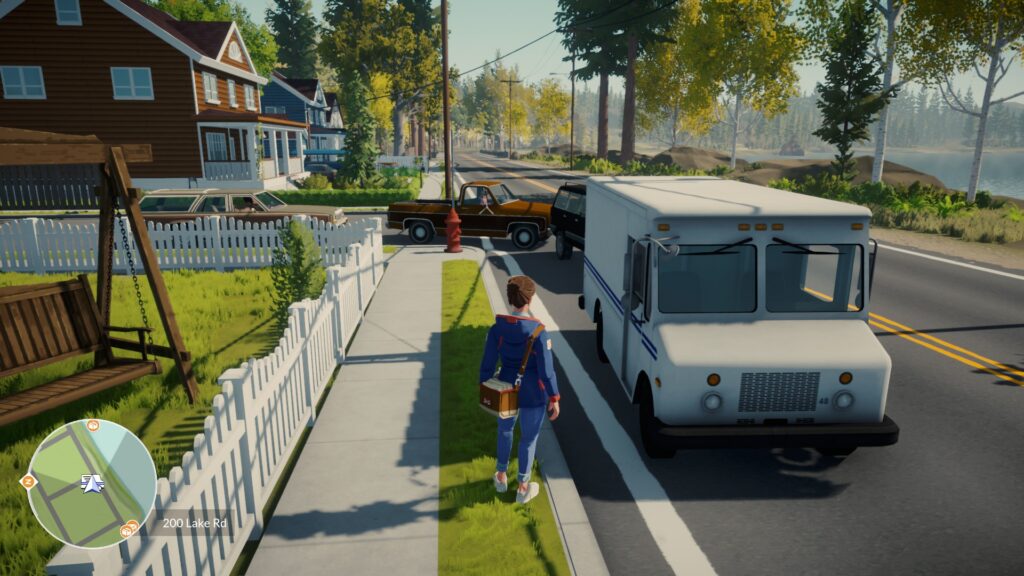
So, where does that leave Lake and where does that leave my opinion on it?
The game is one of the most refreshing stand-outs of this year, and I don’t think it’d be fair to say that I like it, because it wouldn’t be true. I love it. The tedium, the constant, repetitive songs that you can listen to on the radio, the humdrum life of the people you meet, the easy-going lifestyle that is living in Providence Oaks… It feels like a paradise of contemplation and reflection. I didn’t feel as though I was just playing a game when I was playing Lake, I felt like I was relaxing and trying my hand at a lifestyle so very different from my own.
Most of all, I love how easy it was to think about Lake and everything it does and doesn’t say. Sometimes with this job, I can enjoy a game plenty, but feel like it doesn’t speak too much to me outside of my brain going ‘game good’. When I click off Lake and get ready to go to bed, my mind is still in Providence Oaks and is still trying to weigh up the pros and cons of being there or being in the big city. I still don’t know the ‘right’ answer for me or even for Meredith, but I think that’s what makes Lake special: it doesn’t steer you in any direction, it just gives you the wheel and lets you follow your own path.
Score: 5/5
A copy of Lake for PC was provided to Gayming Magazine by the developer.


